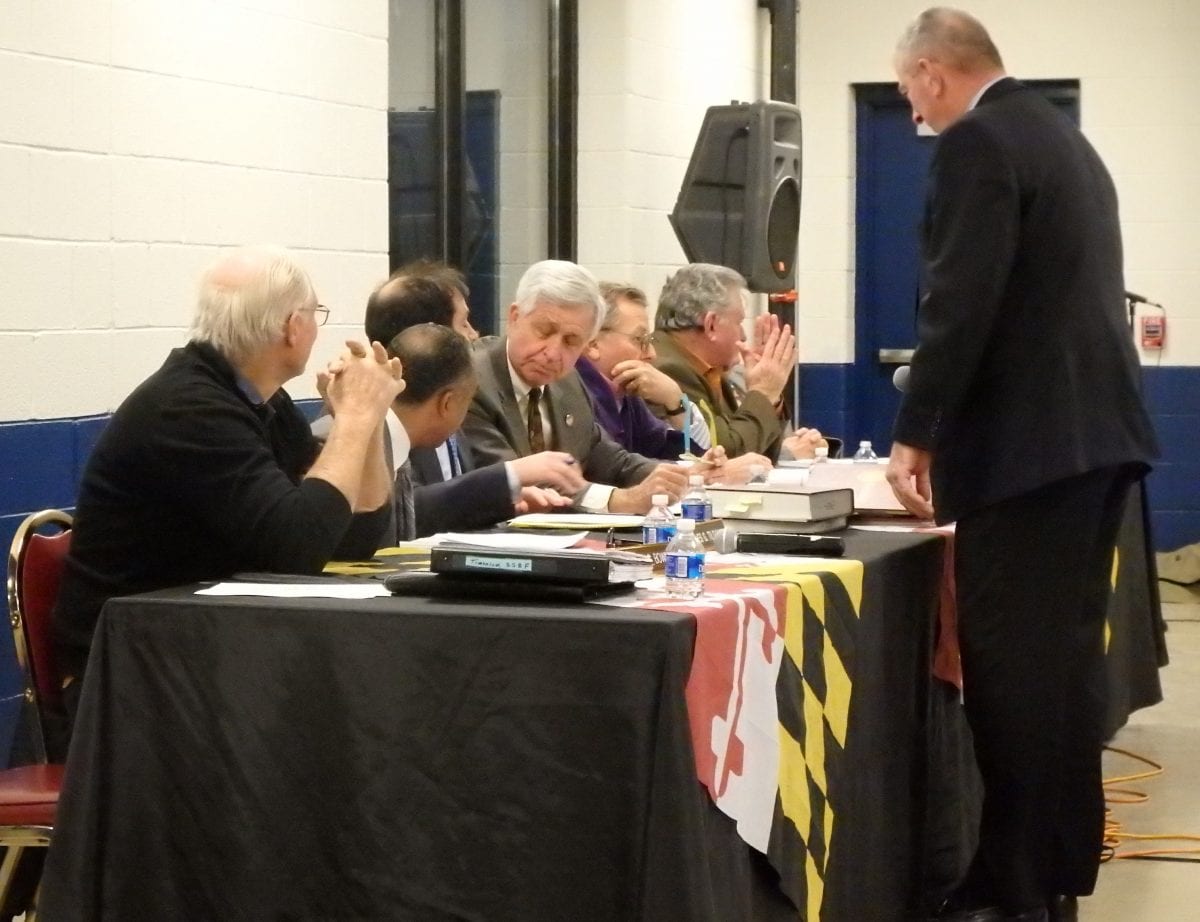Md. Commission rejects Bailes appeal on weighty matter

File photo of the Maryland Racing Commission. Photo by The Racing Biz.
by Frank Vespe
No good deed goes unpunished, says the old saw.
Consider Robbie Bailes convinced.
The trainer came before the Maryland Racing Commission’s monthly meeting at Laurel Park this afternoon hoping it would overturn a January stewards’ ruling disqualifying his trainee Concordia’s Way. In the end, all he got was two hours older than when he arrived, the Commission deciding unanimously to uphold the stews in a decision one Commissioner later described as “easy.”
“At the end of the day, I felt that we were right,” Bailes said after the hearing. “I still believe we were right, didn’t think we got a fair shake. But that’s the way it is. We’re not the home team.”
To paraphrase another old saw, for want of four pounds, the race was lost.
The case arose in December, when Concordia’s Way, a winner just once in his first seven starts, ripped off two straight wins in a five-day period. On Sunday, December 4, he won a Maryland-bred allowance by a length-and-a-half. Five days later, on December 9, the Concord Point gelding was even more impressive, cruising to an open allowance win by over seven lengths.
As Bailes put it, “That’s where things went awry.”
Here’s the problem: Bailes entered Concordia’s Way in the December 9 race on the morning of December 4, prior to his victory that afternoon. At the time of entry, the horse was eligible, as a three-year-old who had not won a race other than claiming, to carry a weight of 119 pounds. That’s the weight at which Bailes entered the horse.
However, his Sunday victory eliminated the weight allowance. Now, as a recent winner of a non-claiming race, he should have carried 123 pounds — four pounds more.
That didn’t come to Bailes’s attention until just a few minutes before the December 9 race was run, when a friend at the track pointed out the potential problem. He said that he called the racing office in a near-panic but was unable to reach anyone who could help, instead leaving voicemails for racing secretary Georganne Hale and assistant racing secretary Jillian Sofarelli.
He didn’t hear back, and the race ran without a hitch, his charge, owned by Sam English, living up to his odds-on favoritism.
But a half hour or so later, Bailes heard from administrative steward Adam Campola. Campola said he’d had received “a phone call from the racing office that the horse had carried the wrong weight.” Following a hearing the next morning, the stewards voted unanimously to disqualify Concordia’s Way and redistribute the purse moneys.
Today, in his appeal, Bailes advanced a two-pronged argument. First, he said, his horse’s facile victory — “by 7 1/2 lengths pulling up the last sixteenth,” he described it — clearly was not affected in any meaningful way by the weight. He almost certainly would have won had he carried the proper weight — or even more.
And second, he said that he had done the right things, for which he was being punished.
“My whole problem with this situation is, I did enter the horse with the correct weight,” he said. “I was not trying to cheat. And I policed myself [by calling the racing office when he learned there might be an issue].
“If I would have entered the horse with the incorrect weight, I wouldn’t be here. If I didn’t call the secretary’s office and basically police myself, I wouldn’t be here.”
He bore some responsibility, he said, but, given the facts, not all of it. He suggested that a fine would be a more just penalty in the circumstances.
But Assistant Attorney General Catherine Bellinger, representing the stewards, said that the case was merely “a matter of the trainer being the absolute insurer of the horse. It is his responsibility to check” to ensure his horse is carrying the proper weight.
Indeed, Maryland’s rules are explicit on the matter.
“A trainer is solely responsible for the weight to be carried by any horse he enters,” the relevant portion reads.
And Campola, the steward, said that the horse was “ineligible to run at” 119 pounds. In cases where horses run in spots in which they are not eligible, he said, to disqualify the horse — or not to — is “the only choice available” to the stewards. They have no option to impose a fine or other penalty.
The situation was a “rare occurrence,” he acknowledged, but the rules are nevertheless clear.
In the end, Bailes left disappointed. The Commission decision will cost his owner a purse that, for a Maryland-bred like Concordia’s Way, would have been worth over $31,000. What’s more, in the meantime, Concordia’s Way’s three starts since have all come against tougher company since, while the appeal was pending, he was treated for eligibility purposes as if he had won.
Still, he said. It was worth the fight.
“I believe totally in what I was saying,” he said. “Like I said, there’s no just way in the world that four pounds makes a difference. And like I said, as far as the rules go, I did what anybody else would do. I called the racing secretary’s office, and I basically policed myself. I would do it 100 out of 100 times because that’s the right thing to do.”








It is the responsibility of the racing office to check conditions for eligibility and assignment of weights
The stewards did not have to disqualify: the horses won easily with a 2 pound difference. Sad!
Should have called the stews after not getting hold of the Racing Office.